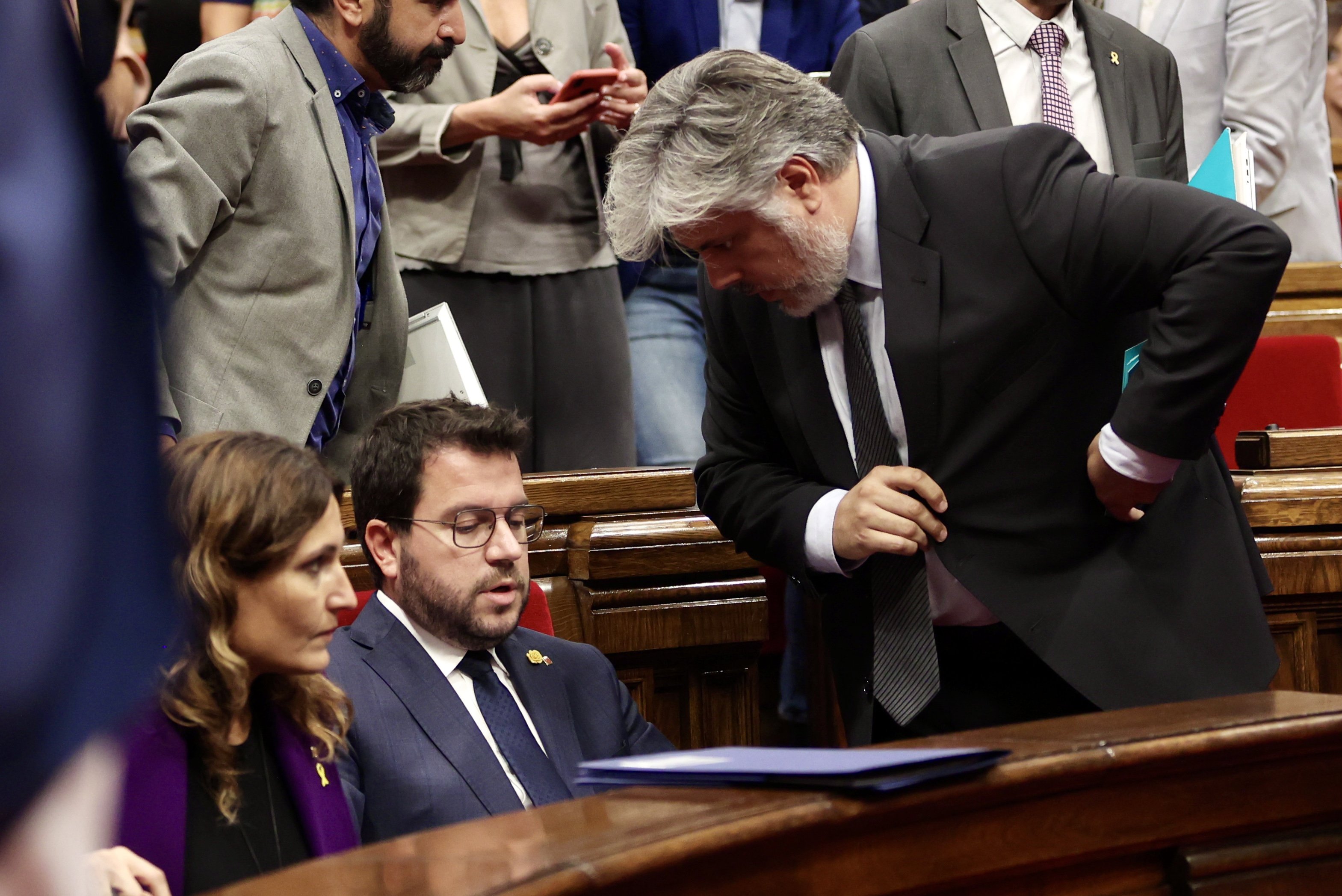The Catalan government's grave crisis casts its shadow over everything, including other institutions, such as the Parliament of Catalonia. This Wednesday saw the executive's first parliamentary question session since the return from the summer break in August and since the coalition between Catalan Republican Left (ERC) and Together for Catalonia (Junts) imploded in late September. Today the two partners laid down their swords a few hours before the start - tonight at midnight - of Junts's two-day consultation of its members on whether or not stay in the coalition. At Wednesday's session, president Pere Aragonès (ERC) wanted to extend his hand, affirming that he wants the current formula to continue and making it clear that "there is room to reach agreements" on the three points that Junts have demanded. However, he also stated that to rebuild the bridges a "100% commitment" of all ministers is needed along with the opening of a new period marked by "mutual respect and maximum loyalty".
In his own speaking turn, the president of the Junts group in parliament, Albert Batet, did not ask any questions, but rather launched a series of reflections. The parliamentary head of Junts recalled that they have "the obligation to fulfill the mandate that they received from the citizens and the duty to comply with the mandate of the 52% to move towards independence". Having delivered this preamble, he again put on the table the three demands made by his party: articulate a new strategic direction, establish coordination mechanisms in Madrid and open the dialogue table to Members of Parliament. "I will not ask any specific questions today. Just an appeal to the responsibility and generosity that applies to us as servants of the public. It also applies to him", concluded Albert Batet.

In his response, Pere Aragonès maintained a conciliatory tone and underlined two facts. The first, that "he wants this government to continue" because it has done "a very good job in a very short time". If everyone dedicates themselves "100%", he added, "the assessment will be even more positive". The second idea was that he is "convinced that there is room to reach agreements" in the three areas proposed by Junts. He gave the example of coordination in the Congress of Deputies "in defence of the actions of the Catalan government". While he pointed out that the correlation of forces is different and "no one can impose", he also made it clear that the will to "coordinate" is there. After the two reflections, the president demanded that, if Junts decides to continue in the executive, that it be involved "100%, with mutual respect and maximum loyalty". And he replied: "If this is the arrangement, you can count on me". However, he also warned that "an agreement would be of no use if in two weeks days we return to the same situation". In any case, he expressed "respect" for Junts' internal processes, whose results he is awaiting.
Beyond the exchange with Junts, the Catalan president affirmed that he wants to take the legislature to its full four-year term in order to focus on responding to the problems affecting the people, especially inflation which has reached 9%. In this context, he stressed the need and intention to pass the budget of his Generalitat government before the deadline and in the appropriate form, again extending his hand, this time to the those who supported the last budget, the left-wing Comuns, but also to the pro-independence leftists of the CUP. This last offering did not fall on fertile ground.
Clash with the CUP
With the swords between ERC and Junts having been sheathed, the question session made it possible to demonstrate another distancing that has occurred within the pro-independence forces, that which separates the current government from the CUP. An MP for the radical left-wing party, Laia Estrada, highlighted the "cruelty of the current moment" and noted how the agreement signed by the CUP with ERC to enable the government is no longer worth the paper it is written on, with public energy plans "reduced to solar panels in public buildings" and an "insufficient social shield ". The deputy even summed up what is happening as a “pantomime”, a term that irritated the president: “Pantomime, no. I accept criticism, but a minimum of respect". Aragonès recalled that the measures proposed by the CUP deputies "are not within the power of the Catalan Generalitat and they know that perfectly". And he added: "We can make it look like we can do it and pass a decree, but the next day everything will continue the same or worse."


